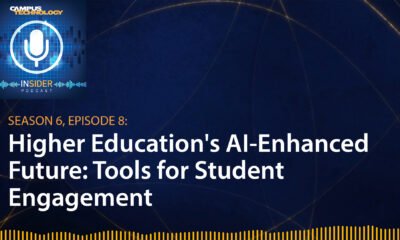Education
AI cheating in US schools prompts shift to in-class assessments, clearer policies
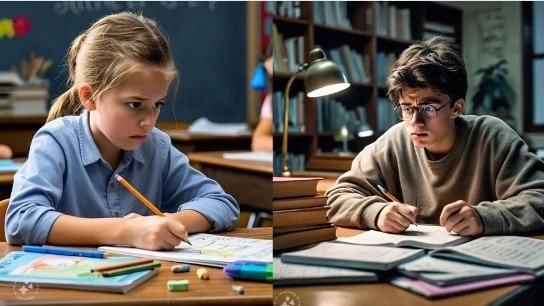
Artificial intelligence is reshaping education in the United States, forcing schools to rethink how students are assessed.
Traditional homework like take-home essays and book reports is increasingly being replaced by in-class writing and digital monitoring. The rise of AI has blurred the definition of honest work, leaving both teachers and students grappling with new challenges.
California English teacher Casey Cuny, a 2024 Teacher of the Year, said, “The cheating is off the charts. It’s the worst I’ve seen in my entire career.”
He added that teachers now assume any work done at home may involve AI. “We have to ask ourselves, what is cheating? Because I think the lines are getting blurred.”
SHIFT TO IN-CLASS ASSESSMENTS
Across schools, teachers are designing assignments that must be completed during lessons. Oregon teacher Kelly Gibson explained, “I used to give a writing prompt and say, ‘In two weeks I want a five-paragraph essay.’
These days, I can’t do that. That’s almost begging teenagers to cheat.”
Students themselves are unsure how far they can go. Some use AI for research or editing, but question whether summarising readings or drafting outlines counts as cheating.
College student Lily Brown admitted, “Sometimes I feel bad using ChatGPT to summarise reading, because I wonder is this cheating?”
POLICY CONFUSION AND NEW GUIDELINES
Guidance on AI use varies widely, even within the same school. Some classrooms encourage AI-assisted study, while others enforce strict bans. Valencia 11th grader Jolie Lahey called it “confusing” and “outdated.”
Universities are also drafting clearer rules. At the University of California, Berkeley, faculty are urged to state expectations on AI in syllabi. Without clarity, administrators warn, students may use tools inappropriately.
At Carnegie Mellon University, rising cases of academic responsibility violations have prompted a rethink. Faculty have been told that outright bans ‘are not viable’ unless assessment methods change.
Emily DeJeu, who teaches at Carnegie Mellon’s business school, stressed, “To expect an 18-year-old to exercise great discipline is unreasonable, that’s why it’s up to instructors to put up guardrails.”
The debate continues as schools balance innovation with integrity, shaping how the next generation learns in an AI-driven world.
(With inputs from AP)
– Ends
Education
AI tools to sweep through UCLA STEM departments, expanding education through AIMS

AI learning tools will be introduced to undergraduate physics and math courses this fall.
The Artificial Intelligence and Math Skills program, a two-year project aiming to decrease learning disparities in introductory STEM courses, will be implemented across physical and life science courses to improve student learning experiences, according to the UCLA Center for Education Innovation & Learning in the Sciences website. The program will use supplemental math materials and AI hinting tools to support students who need more support with mathematical skills, according to the website.
The initiative stems from a joint study conducted by UCLA and UCSD faculty members, which found that incentivized supplemental math assignments are associated with improved exam performance.
Alexander Kusenko, a professor of physics and astronomy at UCLA who serves as the primary investigator for the AIMS project, said levels of performance in calculus and physics courses vary for students from different socioeconomic backgrounds. The results of the study showed that supplemental learning methods and Kudu – an AI learning platform that provides restricted AI-generated hints to students needing support – were associated with higher exam scores for students, he added.
This learning model can be applied in many undergraduate STEM courses, said Shanna Shaked, senior associate director of CEILS who serves as a collaborator on the AIMS initiative. She added that she believes one of the most exciting aspects of this model is how it incentivizes supplemental math activities, as the students who score lowest on exams will earn the most points for completing the supplemental resources.
“That makes me very excited, because we have discovered something useful. And it’s working for all the students, but particularly for the students who need most help,” Kusenko said.
Shaked said the AIMS initiative is funded by the Teaching and Learning Center Tier 4 Grant – which supports larger-scale educational innovations that promote student exploration, creativity, engagement, discovery and success, according to the TLC website. The program was awarded a Track 2 Implementation Grant, which can provide up to $100,000 to teams of faculty and students seeking to tackle student needs and challenges through pedagogical transformation, the website said.
K. Supriya, associate director of CEILS who co-authored the study and serves on the AIMS program, said federal funding cuts affected research for this initiative, as researchers submitted an NSF proposal a few days before UCLA’s funding was paused, and have yet to receive feedback.
[Related: Research grant suspension impacts applied mathematics program, collaboration]
Shaked added that the TLC grant was critical to the implementation of the AIMS project because it is not associated with national funding allocations, allowing research to continue.
“Thanks to that grant, we’re able to keep doing some of the work,” Shaked said. “Not nearly in as much depth or with as much evaluation and research as we would like, but certainly able to continue broadening the use of these promising interventions.”
The TLC funds will be used to support graduate students who help develop materials for the program, as well as the instructors and investigators who implement the program, Shaked said. She added that the grant allows researchers to continue working on the AIMS project, but many participating faculty members are also being impacted by the research funding freeze, which makes adequate compensation for their work and time more challenging.
As the program grows, Supriya said the project will expand its implementation of AI learning tools to introductory chemistry courses, such as general chemistry, with the hope of reaching life sciences courses.
If evidence shows that incentivized supplemental assignments are effective in different contexts and settings, these tools could be useful for instructors at all levels and for all kinds of courses, Supriya added.
As AI becomes increasingly integrated into higher educational institutions, Supriya said researchers should explore how initiatives like AIMS can maintain or increase student learning by offering tailored support.
“It’s a helpful tool,” Supriya said. “I only see the use of such things growing over the next five years.”
Contributing reports by Shaun Thomas, science and health editor.
Education
What I wish I knew before going to university

 BBC
BBCOver the next couple of weeks, hundreds of thousands of new students will descend on universities around the country.
For many, this will mark the start of a brand new adventure – though one often filled with a lot of worry.
To help with nerves, BBC News asked for tips from 2024’s first-years, who’ve already sussed out being freshers.
From balancing studies and social life, to looking after your mental health and the importance of doing the washing up, this is what the class of 2024 have to say to the new kids on the block.
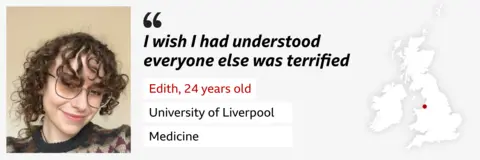
Edith Adam says she was “terrified” when she moved to Liverpool last year to study medicine.
What she hadn’t realised at the time was that other freshers were just as scared as she was.
“I was absolutely terrified about not being able to make friends or that people wouldn’t like me,” says Edith, who’s now going into her second year.
“I wish I had understood everyone else was terrified, and that they appreciate it when you go up to them and say hi.”
 Edith Adam
Edith AdamHaving never been to Liverpool before – a city with a party reputation – Edith worried she might not fit in.
“I was really scared of being ostracised for not wanting to go clubbing every night and not being a drinker,” she says.
But Edith was still able to find her people.
“No one actually cares. There are plenty of things you can do that don’t revolve around late nights. Just find what works for you.”
 Edith Adam
Edith AdamThe 24-year-old, from Huddersfield, says her advice would be not to put too much importance on the infamous freshers’ week.
“I think everyone goes in with the expectation that it’s this amazing, wild week, where you meet your best friends for life and have your best time at uni,” she says.
And her top tip for staying friends with your flatmates?
“If it takes less than two minutes, just do it,” Edith says. “It’s so easy for everything to pile up, and then you don’t wash your plates for five days, and all of a sudden everything is dirty and you have no cutlery – and your flatmates hate you.”
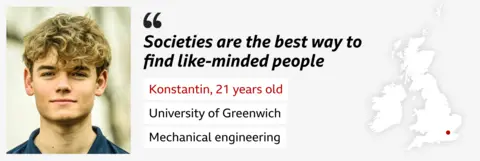
But what if you can’t make freshers week?
This is the situation Konstantin Schmidt faced last year, after issues with his visa delayed his start at Greenwich University by five weeks.
Although people told him the freshers parties he’d missed out on were “fun”, the mechanical engineering student says he still managed to settle in well by joining up to student clubs.
“Societies are the best way to find people who share the same passion,” Konstantin says.
 Konstantin Schmidt
Konstantin SchmidtJoining both a volleyball society and the Formula One society, he says he had positive interactions right from the off.
“The second I joined the room the members saw I was new and instantly included me,” Konstantin says. “I also met new people through volleyball who were on my course who quickly became my friends.”
 Konstantin Schmidt
Konstantin SchmidtThe 21-year-old bonded with his flatmates by exploring each other’s culture through food and music.
In his first weeks, Konstantin, who’s from Bavaria in Germany, made Spätzle – a pasta dish topped with grilled cheese for a dinner party with his flatmates.
“Everyone really liked” his food, he says – but he admits the best dish was a Filipino one made by his flatmate, Kai.
“It helped us understand everyone’s culture even better,” Konstantin says.
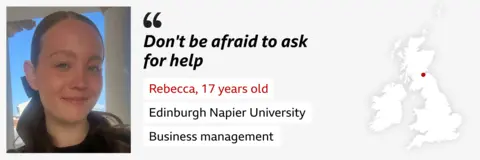
While many people starting university will be living away for the first time, some students still live at home.
Commuting more than an hour each way between Glasgow and Edinburgh, Rebecca can relate.
“If they forget something, my friends can just nip back to their accommodation, whereas I can’t, ” she says. “But it’s not bad, I like commuting in.”
Going into her second year of a business management course, Rebecca is now much more organised and comfortable with the journey, after experiencing some hiccups in her first year.
 Handout
HandoutIn some cases, cancelled trains meant she had to pay for a taxi all the way to Edinburgh.
“In second year I will definitely be checking my trains,” Rebecca says.
Her advice for freshers is simple: “Make sure your bag is fully packed with everything you might need – and plan your commute.”
Rebecca’s university experience has been different from many others as she was only 16 when she started her course.
“I thought everyone was going to be older and not want to speak to me,” she says. “But it wasn’t like that at all. The age gap doesn’t really matter.”
 Handout
HandoutNow 17, Rebecca is still waiting to experience a full freshers’ week, but says she was still able to attend under-18 events.
Her advice for those in a similar position?
“Don’t be afraid to ask for help,” she says. “I felt like I couldn’t ask for help because people would think I didn’t deserve to be there because I’m younger.
“They don’t care that you’re 16 or 17. Just ask for help.”
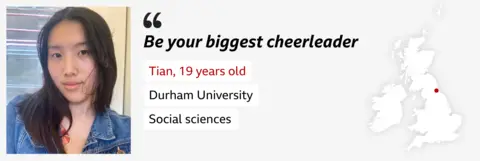
As the first in her family to go to university, Tian Liu didn’t know what to expect before she started her combined honours degree in social sciences.
“I did so much research, but I still felt so unprepared,” Tian says. “University is definitely a roller coaster. There was a point I wanted to drop out, but now I can definitely see the fruits of my labour.”
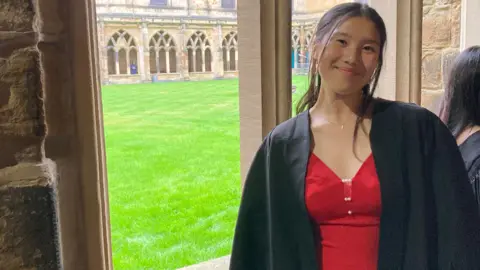 Tian Liu
Tian LiuNow going into her second year, the 19-year-old has found a better balance and would advise incoming students to look after their mental health.
“With tuition fees rising there is such a pressure to make the most out of it, but you can burn out,” Tian says. “University is as much as you make of it, but give yourself grace.
“Have close friends who can act as support and accountability if you are doing too much, and use pastoral teams that the university offers,” she adds.
“There is no need to rush, it’s all a constant learning curve.”
 Tian Liu
Tian LiuOne year on from moving to Durham from Leeds, Tian is in New York completing an internship she got through her university – something she “could never have imagined” last year.
Her advice for incoming students?
“Don’t disqualify yourself from anything. Be your biggest cheerleader. And take so many photos.”
Education
Franklin County Schools considering AI gun detection software
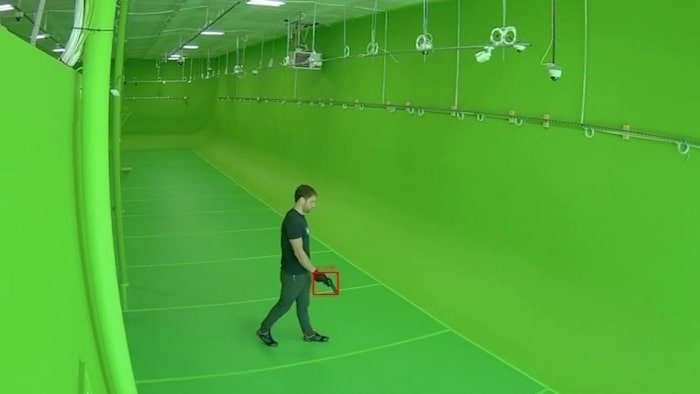
FRANKLIN COUNTY, Va. – School board members are discussing the use of artificial intelligence to detect guns on school grounds.
Superintendent Dr. Kevin Siers said the board has been exploring options, including software from Zero Eyes that uses existing security cameras and AI to identify firearms and alert an incident center within seconds.
“We take safety and security very serious,” Siers said. “So that caused us to take a deeper look into what options are available for weapons detection.”
Dustin Brooks, a co-founder of Zero Eyes, said the system is designed to be proactive and to prompt an immediate response. He described a process in which a camera detects a gun, an operations center verifies the alert, and then dispatches notifications to the school and local authorities.
“From detection — gun brandished in front of camera, camera picks up gun, operation center verifies alert, dispatch alert, customer receives alert — that process can be, you know, as fast as three to five seconds,” Brooks said.
Brooks said human analysts review any images the AI flags, which he said reduces false alarms. He added that the system is narrowly focused on detecting firearms and does not share other images with the information center.
“We’re looking for guns. The only thing that we’re looking for is guns,” he said.
Siers emphasized the move is to prepare for dangerous incidents before they even happen.
“Our resource officers do a great job of trying to study those incidents when they occur and then trying to apply how the lessons learned there might be applied in our schools,” he said. “So it’s just an ongoing process and, unfortunately, it’s something that too many schools are having to deal with.”
If approved, the technology would be implemented at Franklin County Middle School and Franklin County High School.
Roanoke City and Salem Public Schools are among other districts that have used or are considering similar AI detection software.
Copyright 2025 by WSLS 10 – All rights reserved.
-

 Business2 weeks ago
Business2 weeks agoThe Guardian view on Trump and the Fed: independence is no substitute for accountability | Editorial
-
Tools & Platforms1 month ago
Building Trust in Military AI Starts with Opening the Black Box – War on the Rocks
-

 Ethics & Policy2 months ago
Ethics & Policy2 months agoSDAIA Supports Saudi Arabia’s Leadership in Shaping Global AI Ethics, Policy, and Research – وكالة الأنباء السعودية
-

 Events & Conferences4 months ago
Events & Conferences4 months agoJourney to 1000 models: Scaling Instagram’s recommendation system
-

 Jobs & Careers2 months ago
Jobs & Careers2 months agoMumbai-based Perplexity Alternative Has 60k+ Users Without Funding
-

 Podcasts & Talks2 months ago
Podcasts & Talks2 months agoHappy 4th of July! 🎆 Made with Veo 3 in Gemini
-

 Education2 months ago
Education2 months agoVEX Robotics launches AI-powered classroom robotics system
-

 Education2 months ago
Education2 months agoMacron says UK and France have duty to tackle illegal migration ‘with humanity, solidarity and firmness’ – UK politics live | Politics
-

 Funding & Business2 months ago
Funding & Business2 months agoKayak and Expedia race to build AI travel agents that turn social posts into itineraries
-

 Podcasts & Talks2 months ago
Podcasts & Talks2 months agoOpenAI 🤝 @teamganassi














